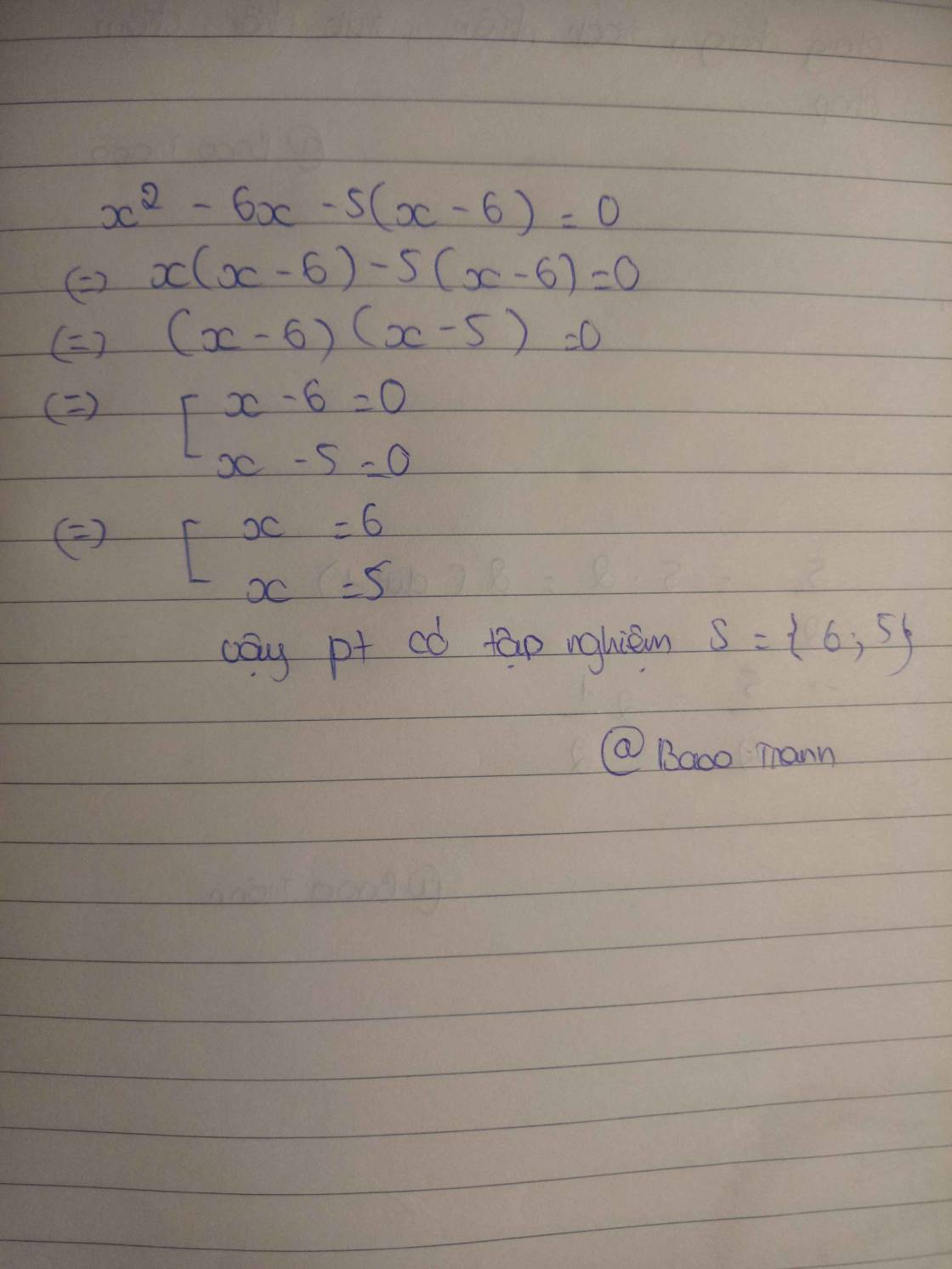Giải phương trình $x^{2}-5 x+6=0$.
Hãy nhập câu hỏi của bạn vào đây, nếu là tài khoản VIP, bạn sẽ được ưu tiên trả lời.


vì \(5+x^2\ge5\left(\forall x\in R\right)\)
=>6x-3=0
=>x=\(\dfrac{1}{2}\)
KL:S=\(\dfrac{1}{2}\)

a.
\(3\sqrt{-x^2+x+6}\ge2\left(1-2x\right)\)
\(\Leftrightarrow\left[{}\begin{matrix}\left\{{}\begin{matrix}-x^2+x+6\ge0\\1-2x< 0\end{matrix}\right.\\\left\{{}\begin{matrix}1-2x\ge0\\9\left(-x^2+x+6\right)\ge4\left(1-2x\right)^2\end{matrix}\right.\end{matrix}\right.\)
\(\Leftrightarrow\left[{}\begin{matrix}\left\{{}\begin{matrix}-2\le x\le3\\x>\dfrac{1}{2}\end{matrix}\right.\\\left\{{}\begin{matrix}x\le\dfrac{1}{2}\\25\left(x^2-x-2\right)\le0\end{matrix}\right.\end{matrix}\right.\)
\(\Leftrightarrow\left[{}\begin{matrix}\dfrac{1}{2}< x\le3\\\left\{{}\begin{matrix}x\le\dfrac{1}{2}\\-1\le x\le2\end{matrix}\right.\end{matrix}\right.\)
\(\Rightarrow-1\le x\le3\)
b.
ĐKXĐ: \(x\ge0\)
\(\Leftrightarrow\sqrt{2x^2+8x+5}-4\sqrt{x}+\sqrt{2x^2-4x+5}-2\sqrt{x}=0\)
\(\Leftrightarrow\dfrac{2x^2+8x+5-16x}{\sqrt{2x^2+8x+5}+4\sqrt{x}}+\dfrac{2x^2-4x+5-4x}{\sqrt{2x^2-4x+5}+2\sqrt{x}}=0\)
\(\Leftrightarrow\dfrac{2x^2-8x+5}{\sqrt{2x^2+8x+5}+4\sqrt{x}}+\dfrac{2x^2-8x+5}{\sqrt{2x^2-4x+5}+2\sqrt{x}}=0\)
\(\Leftrightarrow\left(2x^2-8x+5\right)\left(\dfrac{1}{\sqrt{2x^2+8x+5}+4\sqrt{x}}+\dfrac{1}{\sqrt{2x^2-4x+5}+2\sqrt{x}}\right)=0\)
\(\Leftrightarrow2x^2-8x+5=0\)
\(\Leftrightarrow x=\dfrac{4\pm\sqrt{6}}{2}\)


Bài `1:`
`h)(3/4x-1)(5/3x+2)=0`
`=>[(3/4x-1=0),(5/3x+2=0):}=>[(x=4/3),(x=-6/5):}`
______________
Bài `2:`
`b)3x-15=2x(x-5)`
`<=>3(x-5)-2x(x-5)=0`
`<=>(x-5)(3-2x)=0<=>[(x=5),(x=3/2):}`
`d)x(x+6)-7x-42=0`
`<=>x(x+6)-7(x+6)=0`
`<=>(x+6)(x-7)=0<=>[(x=-6),(x=7):}`
`f)x^3-2x^2-(x-2)=0`
`<=>x^2(x-2)-(x-2)=0`
`<=>(x-2)(x^2-1)=0<=>[(x=2),(x^2=1<=>x=+-2):}`
`h)(3x-1)(6x+1)=(x+7)(3x-1)`
`<=>18x^2+3x-6x-1=3x^2-x+21x-7`
`<=>15x^2-23x+6=0<=>15x^2-5x-18x+6=0`
`<=>(3x-1)(5x-1)=0<=>[(x=1/3),(x=1/5):}`
`j)(2x-5)^2-(x+2)^2=0`
`<=>(2x-5-x-2)(2x-5+x+2)=0`
`<=>(x-7)(3x-3)=0<=>[(x=7),(x=1):}`
`w)x^2-x-12=0`
`<=>x^2-4x+3x-12=0`
`<=>(x-4)(x+3)=0<=>[(x=4),(x=-3):}`
`m)(1-x)(5x+3)=(3x-7)(x-1)`
`<=>(1-x)(5x+3)+(1-x)(3x-7)=0`
`<=>(1-x)(5x+3+3x-7)=0`
`<=>(1-x)(8x-4)=0<=>[(x=1),(x=1/2):}`
`p)(2x-1)^2-4=0`
`<=>(2x-1-2)(2x-1+2)=0`
`<=>(2x-3)(2x+1)=0<=>[(x=3/2),(x=-1/2):}`
`r)(2x-1)^2=49`
`<=>(2x-1-7)(2x-1+7)=0`
`<=>(2x-8)(2x+6)=0<=>[(x=4),(x=-3):}`
`t)(5x-3)^2-(4x-7)^2=0`
`<=>(5x-3-4x+7)(5x-3+4x-7)=0`
`<=>(x+4)(9x-10)=0<=>[(x=-4),(x=10/9):}`
`u)x^2-10x+16=0`
`<=>x^2-8x-2x+16=0`
`<=>(x-2)(x-8)=0<=>[(x=2),(x=8):}`

1) \(\sqrt[]{3x+7}-5< 0\)
\(\Leftrightarrow\sqrt[]{3x+7}< 5\)
\(\Leftrightarrow3x+7\ge0\cap3x+7< 25\)
\(\Leftrightarrow x\ge-\dfrac{7}{3}\cap x< 6\)
\(\Leftrightarrow-\dfrac{7}{3}\le x< 6\)

1, Thay m=6 vào pt ta có:
\(x^2-\left(6-2\right)x-6+5=0\\ \Leftrightarrow x^2-4x-1=0\)
\(\Delta=\left(-4\right)^2-4.1.\left(-1\right)=16+4=20\)
\(x_1=\dfrac{4+2\sqrt{5}}{2}=2+\sqrt{5},x_2=\dfrac{4-2\sqrt{5}}{2}=2-\sqrt{5}\)
\(2,\Delta=\left[-\left(m-2\right)\right]^2-4\left(-m+5\right)\\ =m^2-4m+4+4m-20\\ =m^2-16\)
Để pt có 2 nghiệm phân biệt thì
\(\Delta>0\\ \Leftrightarrow m^2-16>0\\ \Leftrightarrow\left[{}\begin{matrix}m>4\\m< -4\end{matrix}\right.\)

a) Tam thức \(f(x) = - 5{x^2} + x - 1\) có \(\Delta = - 19 < 0\), hệ số \(a = - 5 < 0\) nên f(x) luôn âm (cùng dấu với a) với mọi x, tức là \(\)\( - 5{x^2} + x - 1 < 0\) với mọi \(x \in \mathbb{R}\). Suy ra bất phương trình có vô số nghiệm
b) Tam thức \(g(x) = {x^2} - 8x + 16\) có \(\Delta = 0\), hệ số a=1>0 nên g(x) luôn dương (cùng dấu với a) với mọi \(x \ne 4\), tức là \({x^2} - 8x + 16 > 0\) với mọi \(x \ne 4\)
Suy ra bất phương trình có nghiệm duy nhất là x = 4
c) Tam thức \(h(x) = {x^2} - x + 6\) có \(\Delta = - 23 < 0\), hệ số a=1>0 nên h(x) luôn dương (cùng dấu với a) với mọi x, tức là \({x^2} - x + 6 > 0\) với mọi \(x \in \mathbb{R}\). Suy ra bất phương trình có vô số nghiệm.

Bạn cần viết đề bằng công thức toán (biểu tượng $\sum$ góc trái khung soạn thảo) đẻ được hỗ trợ tốt hơn. Viết như thế kia rất khó đọc => khả năng bị bỏ qua bài cao.
a: =>3x=3
=>x=1
b: =>12x-2(5x-1)=3(8-3x)
=>12x-10x+2=24-9x
=>2x+2=24-9x
=>11x=22
=>x=2
c: =>2x-3(2x+1)=x-6x
=>-5x=2x-6x-3=-4x-3
=>-x=-3
=>x=3
d: =>2x-5=0 hoặc x+3=0
=>x=5/2 hoặc x=-3
e: =>x+2=0
=>x=-2

ĐKXĐ : \(\left\{{}\begin{matrix}x\ne2\\x\ne\dfrac{3}{4}\end{matrix}\right.\)
PT \(\Leftrightarrow\dfrac{5\left(3-4x\right)+6\left(x-2\right)}{\left(x-2\right)\left(3-4x\right)}=0\)
\(\Leftrightarrow5\left(3-4x\right)+6\left(x-2\right)=0\)
\(\Leftrightarrow15-20x+6x-12=0\)
\(\Leftrightarrow-14x+3=0\)
\(\Leftrightarrow x=\dfrac{3}{14}\)
Vậy ...

\(x^2-5x+6=0\) (a = 1; b = -5; c= 6)
Ta có: \(\Delta=b^2-4ac=\left(-5\right)^2-4.1.6=1>0\)
Vậy phương trình có hai nghiệm phân biệt
\(x_1=\dfrac{-b+\sqrt{\Delta}}{2a}=\dfrac{-\left(-5\right)+\sqrt{1}}{2.1}=3\)
\(x_2=\dfrac{-b-\sqrt{\Delta}}{2a}=\dfrac{-\left(-5\right)-\sqrt{1}}{2.1}=2\)